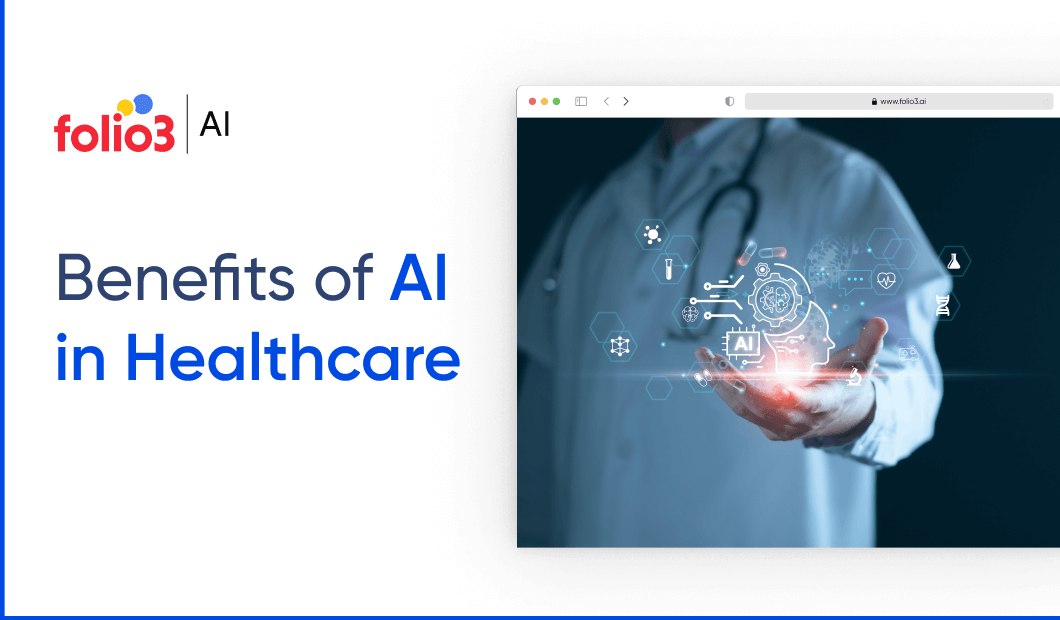Healthcare is a complex and delicate field that requires precision in every step, especially when it comes to critical diagnoses like image analysis through X-rays or cancer screenings. Artificial intelligence (AI) has really helped healthcare by enabling virtual healthcare services to answer patient queries and assist in surgeries, making these processes more efficient.
With AI-driven diagnostics, healthcare professionals can make more informed decisions, improving patient outcomes. Personalized treatment plans are becoming more common, with AI helping to tailor care specifically to each patient’s needs.
There are numerous benefits of AI in healthcare. These technologies play a significant role in preventative care, identifying potential health risks before they escalate. As Dr. Eric Topol, a prominent cardiologist, stated, “AI can enhance the precision of diagnoses and provide insights that were previously inaccessible, ultimately improving patient care.”
This highlights AI’s pivotal role in modern healthcare, enhancing clinical decision-making and supporting personalized treatment approaches. Keep reading to explore more benefits of AI in healthcare.
7 Key Benefits of AI in Healthcare
One of the biggest problems in healthcare has always been delays, even in diagnosing diseases, finding the right treatment, or handling patient records. These delays can cost lives. But with AI, things have changed.
For example, diagnosing cancer used to take weeks, but AI-powered imaging tools can now detect early signs within minutes. This means patients get treated faster, improving survival rates. From speeding up diagnoses to making treatments more precise, AI is reshaping healthcare, making it more efficient and patient-focused.
Improved Diagnosis and Early Disease Detection
At first, managing a massive amount of data was challenging as this process should be fast. AI in healthcare improves diagnostic accuracy by analyzing a large volume of medical data quickly and accurately.
For instance, AI algorithms can identify subtle patterns in medical images, such as MRI scans, to detect conditions like brain tumors or diabetic retinopathy more effectively than human clinicians alone. This capability allows for early detection of diseases, leading to better treatment outcomes and effective patient care.
A study published in the European Journal of Medical Research highlighted that AI techniques have the potential to accelerate the diagnosis and treatment of cardiovascular diseases, indicating high diagnostic accuracy in various applications.
Personalized Treatment Plans
AI is required in personalized medicine to analyze genetic data, medical history, and lifestyle factors to develop tailored treatment plans.
For example, IBM’s Watson for Oncology uses computational reasoning to suggest personalized cancer treatments based on patient data and clinical protocol. This approach ensures that treatments are optimized for individual patient needs, leading to more effective therapies and reduced side effects.
Enhanced Patient Care and Experience
Medical staff often have demanding schedules, balancing multiple responsibilities beyond direct patient care. While every patient is important, their duties extend far beyond bedside treatment, including administrative tasks, medical documentation, and emergency response.
AI manages patient care by taking over administrative tasks, allowing healthcare providers to focus more on patient interactions. AI-powered chatbots and virtual assistants offer personalized guidance and support, enhancing patient education and self-management
Also AI enables real-time monitoring of patients, providing continuous feedback on their health status and allowing for timely interventions. For instance, Philips’ HealthSuite Digital Platform uses AI to monitor patients’ vital signs remotely, reducing hospital readmission.
Faster Drug Discovery and Development
Developing new medicines is a long and expensive process, often taking over ten years and costing billions. A major challenge is finding the right drug compounds that are both safe and effective. Many drugs fail in later stages, leading to wasted time and resources.
AI is changing this by making drug discovery faster and more efficient. It analyzes vast amounts of data to identify potential drug targets and predict how well a drug will work. Companies like Atomwise use AI to quickly scan millions of chemical compounds, reducing the time needed to find promising treatments.
AI also helps predict side effects early, lowering the chances of failure in clinical trials. This means new medicines can reach patients much sooner and at a lower cost.
AI in Surgery and Robotic-Assisted Procedures
Surgery requires great accuracy, and even small mistakes can lead to complications and longer recovery times. Traditional methods depend entirely on a surgeon’s skill, which can be affected by fatigue and human limitations.
AI is making surgeries safer and more precise. Robotic systems powered by AI assist surgeons by providing real-time data, steadying movements, and ensuring accurate incisions. This reduces damage to surrounding tissues and lowers the risk of complications.
For example, the da Vinci Surgical System allows for minimally invasive procedures, leading to smaller cuts, less pain, and faster recovery. As AI continues to improve, surgeries are becoming more efficient and safer for patients.
Predictive Analytics for Disease Prevention
Chronic diseases like diabetes and heart disease develop slowly, often without clear symptoms. Many people don’t know they are at risk until it’s too late, leading to serious health problems and expensive treatments.
AI helps by finding these risks early. It analyzes medical records, lifestyle habits, and family history to find patterns that suggest a person may develop a disease. This allows doctors to take action sooner, like recommending healthier habits or early treatments.
For example, AI can predict heart disease risk and help prevent heart attacks with timely care. This keeps people healthier and reduces medical costs in the long run.
Operational Efficiency in Healthcare Administration
Healthcare workers spend a lot of time on paperwork, billing, and scheduling, which takes away from patient care. Mistakes in records can cause delays and confusion. AI makes these tasks easier by handling billing, appointments, and medical records automatically.
This reduces errors and saves time. It also keeps patient records updated so doctors have the right information when needed. With AI, healthcare staff can focus more on treating patients.
FAQS
What are the pros of AI in healthcare?
AI helps doctors catch diseases early, makes treatments more personal, and even assists in surgeries. It also handles admin work, so hospitals run smoother.
How does AI benefit healthcare?
It makes diagnosis faster, predicts diseases, and helps find new medicines quicker. Plus, it cuts down mistakes and saves doctors time.
What are the benefits of AI in healthcare?
Better care, quicker results, and fewer errors. AI analyzes huge amounts of data, helping doctors make smarter decisions.
Final words
AI’s role in healthcare is multifaceted, from improving diagnostics and treatment plans to enhancing patient care and operational efficiency. Its applications are transforming healthcare by providing more personalized, efficient, and effective care.
In the field of regenerative medicine, AI is advancing healing and recovery techniques, while health tech interoperability is ensuring that different healthcare systems work together seamlessly. With AI’s ability to enhance immune system treatments, healthcare is becoming more precise and effective.
Together, these advancements are shaping the future of holistic health, where technology is closely integrated with patient care to promote overall well-being.

Areeb is a versatile machine learning engineer with a focus on computer vision and auto-generative models. He excels in custom model training, crafting innovative solutions to meet specific client needs. Known for his technical brilliance and forward-thinking approach, Areeb constantly pushes the boundaries of AI by incorporating cutting-edge research into practical applications, making him a respected developer in folio3.









